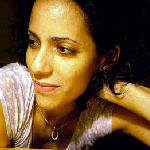|
|
 MARGARET CHO (Q1: #1 of 12) MARGARET CHO (Q1: #1 of 12)
The future of marriage depends on same-sex marriage being made legal. Otherwise, the institution of marriage will be null and void for everyone. Unless same-sex marriage is legalized, there will be no way to honor marriage and be an American at the same time. The Constitution wouldn't apply to the idea that we are all equal, because if gays and lesbians cannot be married, equality is nonexistent. That would mean marriage would be nonexistent, because it would divide the very nature of the statement "We the people . . . " It would be "Us and them the people..." or something like that.
|
|
 JONATHAN AMES (Q1: #2 of 12) JONATHAN AMES (Q1: #2 of 12)
Well, it certainly isn't going to die out, that's for sure. There's too much money at stake. The suppliers Ń Bride magazine, the Catholic Church, banquet halls, the tourist bureaus of Niagara Falls and Tuscany, the rabbi's union, tuxedo shops, three-piece bands, bachelor-party strippers and pink taffeta manufacturers Ń would all rally in a show of great unity and declare that marriage must continue. On a personal level, I see no indication that marriage is on the wane. I recently spent a year in the Midwest, teaching at a university. Many of my students were already married (as undergrads!), or had plans to get married soon after graduation. I found this a bit shocking, coming as I do from New York City, where most people never marry.
Why New Yorkers are slow to marry, I'm not sure. Maybe the whole ethos of the city Ń the F. Scott Fitzgerald notion that there's always a better party somewhere, i.e. a better, more suitable lover somewhere Ń curtails the desire to settle down. I think high rents somehow affect our collective maturity level: because everyone just about breaks even or lives in debt, we don't think we're adults Ń adults have savings accounts Ń and thus we don't think we should marry. It seems that when New Yorkers do marry, they're in their 40s and 50s. They're more or less worn out by high rents and promiscuity, so they find a fellow middle-aged person to hold onto and collapse with.
Conversely, why Midwesterners are marrying soon after puberty is also a mystery to me. I can only conjecture that after the late-'80s AIDS explosion, the notion of marriage as a safe sexual haven really took off in the Midwest. So these 21st-century kids are shacking up early so that they can screw without fear.
What is the future of marriage? I guess my answer is that it will continue, and I don't see any great changes occuring. Which is an easy answer, but I'm no great prognosticator. I will say that as long as marriage is around, its dark doppleganger Ń divorce Ń will continue on as well.
|
|
 SUSAN SHAPIRO BARASH (Q1: #3 of 12) SUSAN SHAPIRO BARASH (Q1: #3 of 12)
Based on my research for The New Wife: The Evolving Role of the American Wife, my thought is that marriage will always be valued and sought after by both men and women in our society. To be a wife remains a respected and coveted role for American women, and the idea of being chosen, of being "the one," is a worthy goal. Despite the high divorce rate, love-based marriages — the allure of romantic love and love everlasting — are encouraged by the media on a daily basis. And we must remember that the rate of remarriage is 75 percent, according to the U.S. Census. That's another vote of confidence for the institution. For young married couples of the 2lst century, there is the belief that they will get it right, better and more successfully than their parents' generation. Their point of view and determination show us the ongoing importance of marriage.
|
|
 BLAISE K (Q1: #4 of 12) BLAISE K (Q1: #4 of 12)
I just asked my friend this question (single male, 32). "What do you think is the future of marriage?" "I don't know," he said. "I'm just trying to avoid it." I hear this kind of thing a lot. Still, I don't see marriage ever being completely outmoded. For those who aren't totally fearful of it or against it as a social construct, I think as long as they feel that they can define, or redefine, what marriage means to them as individuals and as a couple, the future of the institution will never really be jeopardized. Marriage is steeped in tradition. Tradition means a lot to many people. There will always be people who want to get hitched.
|
|
 DARCY COSPER (Q1: #5 of 12) DARCY COSPER (Q1: #5 of 12)
Incrementally different over time, that's my cowardly and uneducated guess. The current political debate about gay marriage is raising profound questions about what marriage means for everyone, gay and straight, and IÕll be very interested to see the short- and long-term outcome of those inquiries.
I donÕt want to get married, and IÕm skeptical about the institution in general, but IÕm also adamantly and actively pro- gay marriage. It seems to me this is an extremely simple, clear-cut civil rights issue, and that if church and state were truly separated by our legislators, there would be no debate left, just the obvious mandate to grant equal rights and legal protections to all U.S. citizens. (And letÕs not overlook what it could do for the economy; just imagine the disposable incomes of all those same-sex couples and their friends being tapped by the wedding-industrial complex. Queer Eye for the Bridal Registry — the mind boggles, doesnÕt it?)
The issue gets more complex and compelling for me when some activists insist that to offer civil unions rather than marriage for gay couples is insufficient, even if those unions were to provide every single legal benefit of marriage except the term "marriage" itself. I donÕt disagree; to legislate only civil unions smacks of faux tolerance and ugly Ņseparate but equalÓ bet-hedging.
But if, as suggested by gay-rights supportersÕ resistance to settling for civil unions, marriage isnÕt merely a legal liaison; if it isnÕt necessarily a religious institution; if itÕs no longer required to socially sanction sex or children; since itÕs not an economic need or social protection for women (because marriages are as likely to end as they are to endure); and as itÕs now perfectly plausible, economically, legally, and socially, for a couple to spend a lifetime together without marriage — then what is marriage for? How does it serve us? What real or symbolic power does marriage have that in this progressive, innovative era it persists as the one ancient tradition to which members of all strata of society so passionately adhere? IÕd love to hear Hooksexup readersÕ ideas on this.
I can imagine one scenario about the future of marriage: Suppose civil unions, rather than marriages, are legislated for gay couples, as seems a likely intermediate step for U.S. voters and legislators. What if straight couples like as me and my boyfriend — monogamous, cohabitating couples whoÕve made long-term or lifetime commitments to each other but resist marriage per se, with all its associations and implications — began to forgo marriage in favor of civil unions?
|
|
 JIM DE SÈVE (Q1: #6 of 12) JIM DE SÈVE (Q1: #6 of 12)
The institution of marriage and its incumbent traditions and ceremonies will continue on pretty much as they have for the past fifty years or so, while becoming more inclusive. Which is to say, the philosophical emphasis behind marriage — at least within this culture — will remain on love and the idea of a stabilizing family force. Over the past century, marriage ceased being the only means to financial security. It became a personal decision, about making oneÕs own life with a partner, or making oneÕs own family — separate but related to the family of oneÕs origin. At the same time, gender roles within marriage will continue to become less important and restrictive. While the tradition and legal recognition of marriage will open up to gays and lesbians, the impact on the tradition itself will be almost unremarkable.
|
|
 MAGGIE GALLAGHER (Q1: #7 of 12) MAGGIE GALLAGHER (Q1: #7 of 12)
I am pretty comfortable with saying that in the long run, marriage will prevail.
The marriage idea occurs again and again in human culture, in widely varying places, and in widely varying form, but it always has something to do with bringing together the people who make the baby, so that a) society gets the next generation it needs and b) children get both a mother and a father.
You have to ask yourself: why? There aren't many ideas as universal in human culture as marriage. I think the answer is pretty obvious: a) sex makes babies; b) societies need babies; and c) children need mothers and fathers.
Successful societies (by which I don't mean "good" or "moral" societies, but simply societies that succeed in reproducing themselves through history) recognize the need to channel the energy of young men and women into this particular kind of relationship. "Marriage" is the word for the way we try to create and sustain this social ideal.
Societies that lose the marriage idea are replaced (and sometimes fairly rapidly) by people and cultures that manage to hang onto this vision.
I realize that all three components of what I am calling the "marriage idea" are now controversial. Many people claim that sex doesn't make babies (in spite of the fact that that half of our pregnancies are unintended and one-third of our children are born outside of marriage). Many people believe that overpopulation now threatens us and that babies are consumption items, or luxury goods, not an essential task any society must do. And some people still contest the idea that family structure matters, that kids really do better if they are raised by their own mom and dad.
Big topics for another day.
Marriage will survive. Whether marriage will survive in America, or American civilization can perpetuate itself in the long run without a stronger marriage culture, is another matter.
|
|
 MOLLY JONG-FAST (Q1: #8 of 12) MOLLY JONG-FAST (Q1: #8 of 12)
Before I start, let me just say I am married and have been for six months.
Ah, the future of marriage. I believe that the future will be a lot like The Jetsons. We will swallow pills for nutrition instead of bothering with the tedious and messy process of cutting our food up and chewing it. We will go to the moon for the weekends instead of to the Hamptons. A small robotic vacuum cleaner will be available for a modest price. And the most radical change: every family will have its own time-travel machine, which will look like a silver DeLorean, with Michael J. Fox as a chauffeur.
As for marriage, in the future women will marry often. They will often try to marry before the age of thirty. If they do not achieve this prodigious feat, they will chronicle their distress in endless autobiographical novels. These will be dubbed (in a decidedly non-futuristic and non-feminist way) "chick lit." Men, on the other hand, will try in the future to avoid marriage at all costs. If they are rich, they will make their fiancˇes sign prenuptial agreements (preferably drafted by my stepfather, the great divorce lawyer Kenneth David Burrows). Yes, the future of marriage is bleak, with superficial men picking up gold-digging wives who will spend an amount equivalent to the national debt of Morocco on plastic surgery, personal trainers, high spike-heeled shoes, and other ways of improving the marginal returns on oneÕs physiognomic capital. Yes, in the future, people will marry for the wrong reasons Ń money, power, fame, or because they are the evil David Gest. Yet the sanctity of marriage will be protected, because gay couples who love each other very much and have been together for years will still not be able to marry, which would undermine the beauty and majesty of an institution that Elizabeth Taylor has signed on for eight times (twice with the same man).
|
|
 DAVID MOATS (Q1: #9 of 12) DAVID MOATS (Q1: #9 of 12)
Marriage will continue to be as varied as human experience. Go back to Shakespeare, when marriage was mainly an economic and political institution, to understand the torments and joys attending the reality of marriage. The struggles of love depicted in his comedies will continue to exist; the failures of love depicted in his tragedies will also continue to exist.
The social and personal components of marriage will continue to war with one another as people push at the boundaries of their personal worlds, following their hearts in surprising directions. Those who promote marriage Ń both those seeking to preserve heterosexual marriage unchanged and those promoting gay marriage Ń emphasize the commitment and stability growing out of marriage. But the virtues of marriage are no guarantee against the anarchy of the heart and the yearning and pain that sometimes undermine our most sacred commitments.
Marriage as an institution exists as an ideal, an aspiration. Young men and women, gay and straight, who resolve to explore their sexuality freely and without commitment are sometimes surprised to realize as they grow older that the virtues of committed love are increasingly appealing. As gay and lesbian couples get married in Massachusetts, they threaten to undermine the most fervent warnings of anti-gay advocates. Married gays and lesbians demonstrate that committed love by people of the same sex does not threaten straight marriage. If marriage is a socially conservative institution - establishing social stability for couples and children, taming the anarchy of sexual love - then marriage will play the same conservative role for gay and lesbian couples as for heterosexuals. And once the world sees that gay marriage causes no harm, warnings of social catastrophe will sound increasingly hollow. Gay and lesbian marriages in San Francisco, Oregon and elsewhere have already shown how extending rights is an occasion for joy, rather than a cause for fear. No one can guarantee that any marriage, gay or straight, will offer the fulfillment that marriage promises. Each of us has to find our own way toward openness and love. But by allowing gays and lesbians to marry, we tear down the walls of a ghetto to which part of our population had been consigned. As additional states tear down their ghetto walls, gay and straight will increasingly find they are living in one world, each of us seeking love as we can.
|
|
 DR. SCOTT HALZMAN (Q1: #10 of 12) DR. SCOTT HALZMAN (Q1: #10 of 12)
People need marriage. Not cohabitation, not serial monogamies, not commitment ceremonies, but real marriage. Men and women need attachment; marriage is the means to fulfill that need.
Finding the right woman or the right man represents the termination of a quest that begins almost at birth, and takes on a new meaning when sex hormones besiege our bodies. Through fantasizing, flirting, dating and mating we cull through the possible candidates for a person to whom we want to attach. We want, more than anything, to make that person ours.
Need we be bonded to others, however, through government auspices and social constraints? Doesn't the very word "bond" run contrary to American ideals? After all, aren't permanent attachments unnecessary and archaic?
Yet those social and governmental intrusions serve a critical role in providing structure and definition to the relationship of two people. When I met my wife seventeen years ago at a Club Med, I wanted to go beyond telling my friends and families that I found a great gal. I wanted to make it official, have the world know, and, in kind have the world sanction it. I wanted to bond with her; that bond was my choice. In short, I wanted to marry her. Marriage elevates the relationship of a man and a woman; it brings them closer to God. It also gives them a unique social status; I no longer have a "babe," I have a "wife." And for anyone that's been married, there's a world of difference.
|
|
 KEITH BLANCHARD (Q1: #11 of 12) KEITH BLANCHARD (Q1: #11 of 12)
If marriage is all about giving up some of yourself for the sake of the partnership, the outlook's not good: People, or Americans, anyway, are more selfish than they've ever been. And the odious social underpinnings of marriage have fallen away: Men don't need a wife to advance in their company (to whatever extent anyone advances within one company these days), and women don't need to stay married to keep goods or social status. Good for humanity; bad for this particular institution. It's easy to read the tea leaves and pronounce marriage doomed.
But nobody really believes that. Marriage is one of the most tenacious ideas the Western world has ever come up with. For every Billy Bob and Angelina who can't keep it together (and what's going to happen to Brad and Jennifer? Aaaaa!) there's a Nick & Jessica newlywed show, a high-end celebrity wedding (Trump's next, right?), a reality TV show dedicated to helping people find their mates (as long as they suffer entertainingly along the way).
So the idea's alive and well, though we've certainly come quite a long way from the arranged-marriage heir bearing and goods transferral device of ye olde days. The global connectivity of modern Internet-fueled video dating and so on already make it vanishingly easy to find just the right person you never would have even come in contact with two generations ago. You're an intellectual S&M addict who loves baseball, Manx cats, and 50 Cent? Have we got the girl for you.
|
|
 ETHAN WATTERS (Q1: #12 of 12) ETHAN WATTERS (Q1: #12 of 12)
This generation has delayed marriage longer than any generation in American history. This in itself is remarkable and has led to innumerable changes in the manner and meaning of young adulthood. But the fact also highlights the question at hand: what does this mean for the future of marriage? There are two possibilities. Some sociologists assume that we here in America are moving the way of Europe, which has steadily devalued the institution. Perpetual cohabitation is now an accepted long-term outcome for heterosexual relationships. The other possibility is that marriage will swing back into style, driving the average marrying age down.
I believe that the idea of marriage is far too deep in the American psyche for us to give it up anytime soon. As the lead cohort of marriage delayers hits their forties, I believe there will be a rush back to the altar. The average marrying age will come back down by a year or two (but never back down to anything near the 1950s and 1960s levels). We will still have a large group of single adults but the vast majority of us will invest our lives in our new marriages. My guess is that weÕll be good at being married. Having waited to become fully formed adults, we will have maturity and composure to weather the tough spots. The irony is that the generation that has delayed marriage might also reinvigorate the institution.
|
|
Question 1:
WHAT IS THE FUTURE OF MARRIAGE?
Question 2:
The FERTILITY GAME: WILL PEOPLE START MARRYING YOUNGER?
Question 3:
GROUNDS FOR DIVORCE?
Question 4:
UNMARRIED... WITH CHILDREN?
Question 5:
SAME-SEX MARRIAGE?
Participants:
BIOGRAPHIES
|












